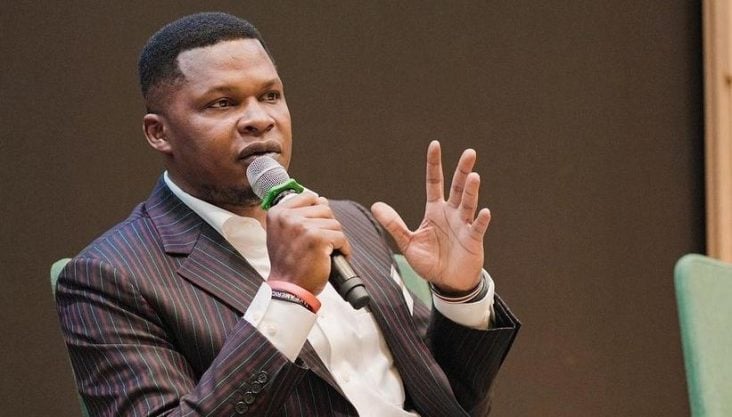NJ Ayuk, the former head of the South African law firm Centurion Law Group, is now pinning his hopes on the development of oil and gas fields on the African continent. As president of the African Energy Chamber (AEC), this Cameroonian oil lobbyist is behind a number of key events in the African oil industry.
From African Energy Week in Cape Town to the Invest in African Energy Forum in Paris, Ayuk brings together African politicians, public and private sector bosses and international investors to unblock stalled projects and boost investment.
The author of two books on African black gold – Billions at Stake, the Future of Energy and Business in Africa and A Just Transition: Abolishing Energy Poverty Through an Energy Mix – the AEC president took to the podium after COP28 to call on African decision-makers to reject anti-fossil fuel policies.
At a time when hydrocarbons no longer enjoy good press, Ayuk still believes that “Africa must firmly keep its promise to use oil and gas to improve the lot of its people”. He spoke to us about the hot issues in the sector.
Investment in the oil sector is falling sharply. Can African producers reverse this trend?
There are a number of strategies they can use to overcome the shortage of international investment in fossil fuels and diversify their sources of funding: bilateral agreements, regional partnerships or working with private investors.
Public-private partnerships are a collaborative approach, where governments and private companies share risks and responsibilities. Another option is to encourage domestic investment in order to create favourable conditions for the participation of local companies and stimulate economic growth.
Africa is capable of financing its own future
In addition, institutions such as the African Development Bank (AfDB) and Afreximbank play an important role in financing large-scale oil and gas projects in Africa.
The African Petroleum Producers Organisation (APPO), alongside Afreximbank, is behind the creation of the African Energy Bank, which aims to find alternative financing solutions for these projects. This initiative proves that Africa is capable of financing its own future.
Will the African Energy Bank, due to come into being this year, be a game changer?
The creation of this institution, which specialises in financing African energy projects, aims to reduce the dependence of African nations on foreign financing and enable them to benefit from their abundant oil resources.
This bank could play a crucial role in mobilising resources, attracting investment and offering tailor-made financial solutions that meet the specific needs of the African energy sector.
Its creators wanted to emphasise the importance of self-sufficiency and also of meeting the challenges posed by the lack of international investment.
The AEC supports this initiative, which will enable Africans to stimulate the development of their oil and gas sector, thereby boosting growth and job creation and improving energy infrastructure.
Côte d’Ivoire, Senegal, Mozambique, Uganda… How can future African producers make the most of their oil and gas projects and ward off the s0-called black gold curse?
Firstly, transparent and accountable governance is essential. This means putting in place sound regulatory frameworks and anti-corruption measures to ensure that oil and gas revenues help to drive the economy as a whole.
It is also essential to diversify the economy beyond the energy sector, by investing oil revenues in other sectors, such as infrastructure, education and health, to create a more resilient and balanced economy.
Africa should change its perspective and not depend on foreign aid
Furthermore, prioritising the development of local content and encouraging the participation of local companies in the oil and gas value chain will also promote job creation, skills development and technology transfer – with the aim of making economic growth more inclusive.
Should African countries accept the promises of aid for the energy transition made to them on the sidelines of COP28, at the expense of their oil and gas projects?
Absolutely not. Africa should change its perspective and not depend on foreign aid, and manage its own oil and gas resources to finance its economic future. History has shown that foreign aid, however well intentioned, often has unintended consequences, such as increased poverty and the emergence of systemic corruption.
My position is clear: rather than succumbing to external pressure, African states should exploit their oil and gas resources to stimulate growth, create opportunities – jobs, income – and reduce energy poverty. This approach, which combines the use of hydrocarbons with investment in renewable energies, is in line with the AEC’s vision of a self-sufficient and prosperous Africa.
How should African decision-makers respond to pressure from the West?
They have the sovereign right to define their own energy policy, whether in terms of fossil fuels or clean energy, without interference from the West. It is essential that African nations determine their energy strategy on the basis of their own economic and social needs. This approach makes it possible to find solutions that reconcile energy security, economic growth and environmental sustainability in a way that is in line with the interests and aspirations of the African continent.
Understand Africa’s tomorrow… today
We believe that Africa is poorly represented, and badly under-estimated. Beyond the vast opportunity manifest in African markets, we highlight people who make a difference; leaders turning the tide, youth driving change, and an indefatigable business community. That is what we believe will change the continent, and that is what we report on. With hard-hitting investigations, innovative analysis and deep dives into countries and sectors, The Africa Report delivers the insight you need.




